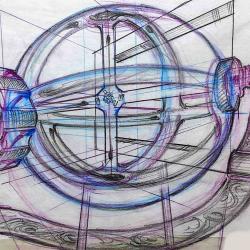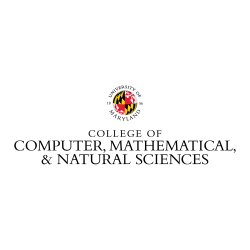Meet UMD Biochemistry and Economics Undergraduate Amy Zhou
Zhou’s research experiences at UMD led to a presentation at one of the largest physician conferences in the world
Amy Zhou always had an interest in medicine, but she also wanted the opportunity to step outside science. That’s why she chose to attend the University of Maryland.
 “I came to UMD to navigate the waters and figure out what I really want to do,” said Zhou, a Banneker/Key Scholar and biochemistry and economics dual degree student who plans to graduate in May 2017. “UMD is the perfect place for that, considering what a large and progressive institution it is.”
“I came to UMD to navigate the waters and figure out what I really want to do,” said Zhou, a Banneker/Key Scholar and biochemistry and economics dual degree student who plans to graduate in May 2017. “UMD is the perfect place for that, considering what a large and progressive institution it is.”
In addition to taking courses to prepare for medical school, Zhou serves as a board member for UMD’s literary journal, Stylus; volunteers with the community service organization TerpService; and led an Alternative Breaks service trip to Nashville, Tennessee, to study immigration and refugee rights.
During her freshman year, Zhou also took a course in economics on a whim. She found it fascinating as a source of insights into human behavior and motivations, and chose to pursue a second degree.
When Zhou was selected to participate in the UMD Scholars Summer Research Program in 2016, her interest in the intersection of medicine and human behavior led to a project with Maureen McCunn, a professor of anesthesiology at the UMD School of Medicine in Baltimore. Zhou studied how trauma team members of different genders and in different occupations—for example, medical students versus fellows—perceived the satisfaction and collaboration levels within their teams.
“Amy is a bright, talented and enthusiastic learner,” McCunn said. “She may be the first undergraduate student to ever present scientific research at an international conference of physicians, pharmacists, and nurses! On the personal side, Amy is intuitive, kind, understanding and generous with her attention and her time. She is an outstanding example of the type of human being that we hope will be a physician in the future.”
Last fall, Zhou’s and McCunn’s work was accepted as a poster presentation at one of the largest physician meetings in the world—the Society of Critical Care Medicine’s (SCCM) 46th Critical Care Congress in Honolulu, Hawaii. However, McCunn did not have funding to send Zhou to the January 2017 conference.
That’s when Mary Ann Rankin, UMD provost and senior vice president, Jayanth Banavar, dean of the College of Computer, Mathematical, and Natural Sciences and Gregory Ball, dean of the College of Behavioral and Social Sciences stepped in and offered Zhou $3,000 in travel funds to attend the conference and present her poster.
“It’s very easy to forget how personal a university can be when you’re on a campus of 40,000 people,” Zhou said. “I was overwhelmed with gratitude and appreciation for this gesture.”
 At SCCM, Zhou surrounded herself with more than 6,000 international critical care professionals who discussed topics such as burnout in health care, end-of-life care versus continued aggressive management, and ethical issues surrounding physician-assisted suicide and euthanasia in the intensive care unit.
At SCCM, Zhou surrounded herself with more than 6,000 international critical care professionals who discussed topics such as burnout in health care, end-of-life care versus continued aggressive management, and ethical issues surrounding physician-assisted suicide and euthanasia in the intensive care unit.
“It’s extremely important that we support students like Amy in any way we can when they are presented with amazing opportunities that could transform their student experience and their future career path,” Banavar said.
Zhou also submitted her poster, “Collaboration and Satisfaction of Ad Hoc Trauma Team Members,” for a Research Snapshot Presentation at the conference. Her abstract was one of 14 chosen out of more than 100 submissions from the surgery/trauma/burns category.
Her talk discussed the study’s findings, which showed that males perceived significantly higher levels of collaboration and satisfaction than females. In addition, physicians reported significantly higher levels of collaboration and satisfaction compared with nurses.
The presentation sparked debate, according to Zhou, since some audience members disagreed that gender disparities exist in hospitals. After the talk, she found herself answering questions that helped her gain useful insight into aspects of her research that need further investigation.
“The feedback and reception was spectacular,” Zhou said. “This exposure to real world health care issues was invaluable to me. I still plan on going to medical school, but down the line I’d like to pursue the business aspect in order to make a systemic change in the healthcare system.”
Zhou also had the opportunity to try out the “work hard, play hard” ethos shared by many in the medical profession. After the conference, Zhou explored Oahu. She swam in the ocean at Waikiki Beach, visited Diamond Head State Park, went shark diving, ziplined through a rainforest and jumped from a waterfall after hiking along Maunawili Falls Trail.
“Traveling alone for the first time was an experience in and of itself,” Zhou said. “Within five short but magical days, I found myself in new places partaking in brilliant new adventures, all while exploring my career options. The day my plane touched back down in Maryland was the first day of classes for my last semester at UMD. It was a pretty good beginning to an end.”
###
Media Relations Contact: Irene Ying, 301-405-5204, zying@umd.edu
University of Maryland
College of Computer, Mathematical, and Natural Sciences
2300 Symons Hall
College Park, MD 20742
www.cmns.umd.edu
@UMDscience
About the College of Computer, Mathematical, and Natural Sciences
The College of Computer, Mathematical, and Natural Sciences at the University of Maryland educates more than 7,000 future scientific leaders in its undergraduate and graduate programs each year. The college’s 10 departments and more than a dozen interdisciplinary research centers foster scientific discovery with annual sponsored research funding exceeding $150 million.







